AI, Talent Management & Change in the 21st Century Global Climate
VerifiedAdded on 2023/06/10
|11
|1890
|96
Report
AI Summary
This report examines contemporary management issues in the 21st century, focusing on the role and impact of artificial intelligence (AI) on business strategy and workforce management at a global level. It evaluates the significance of talent acquisition, development, learning, and change management in the current global competitive climate. The report highlights how AI can improve sales, customer experience, and fraud detection, and provides predictive analysis across various industries. It also discusses the application of HR theories, such as the organizational lifecycle theory, to understand the impact of AI at different stages of business maturity. The report concludes that AI significantly contributes to organizational strategies and workforce management, while also emphasizing the importance of talent acquisition, learning, development, and change management for sustained growth and competitiveness in the global landscape. Desklib offers similar solved assignments and resources for students.
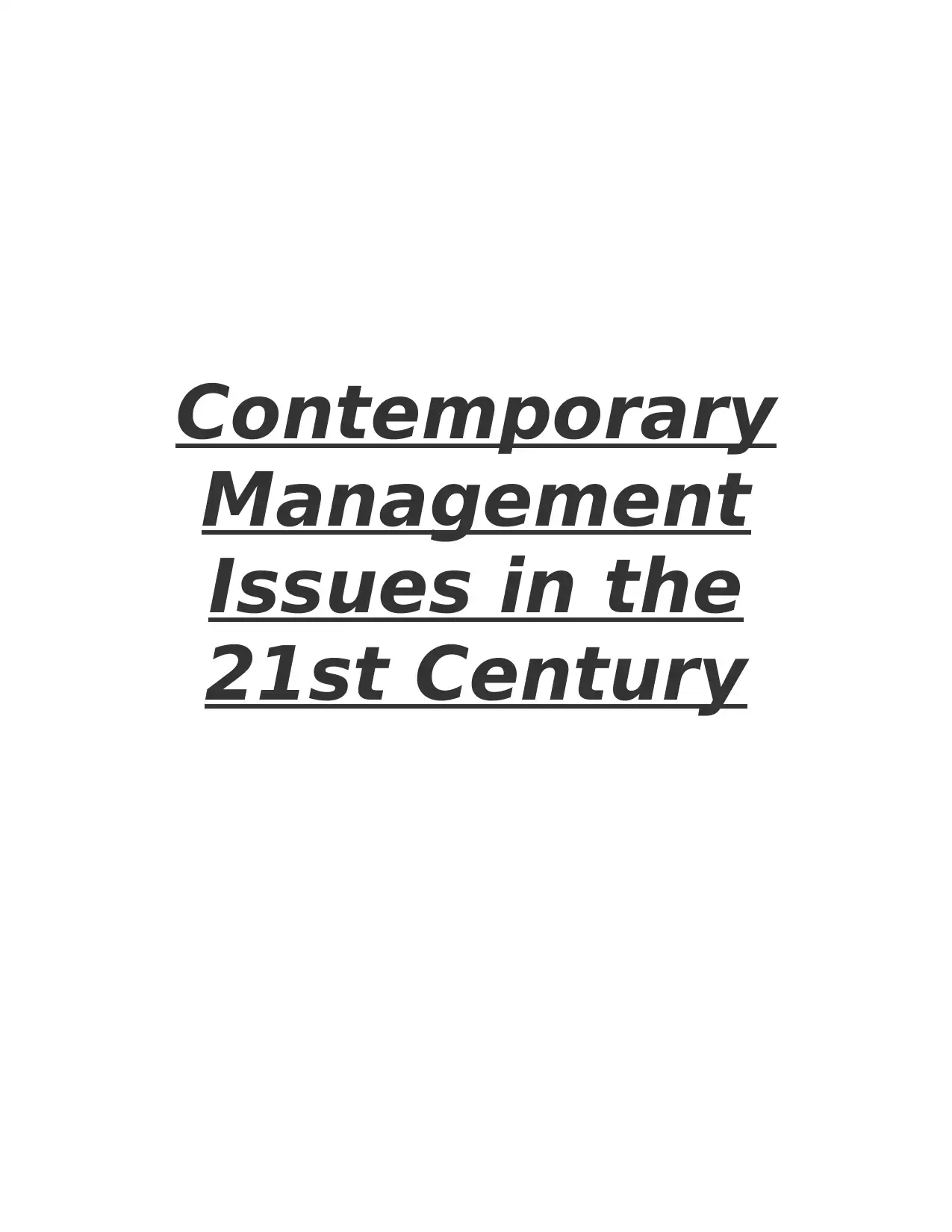
Contemporary
Management
Issues in the
21st Century
Management
Issues in the
21st Century
Paraphrase This Document
Need a fresh take? Get an instant paraphrase of this document with our AI Paraphraser
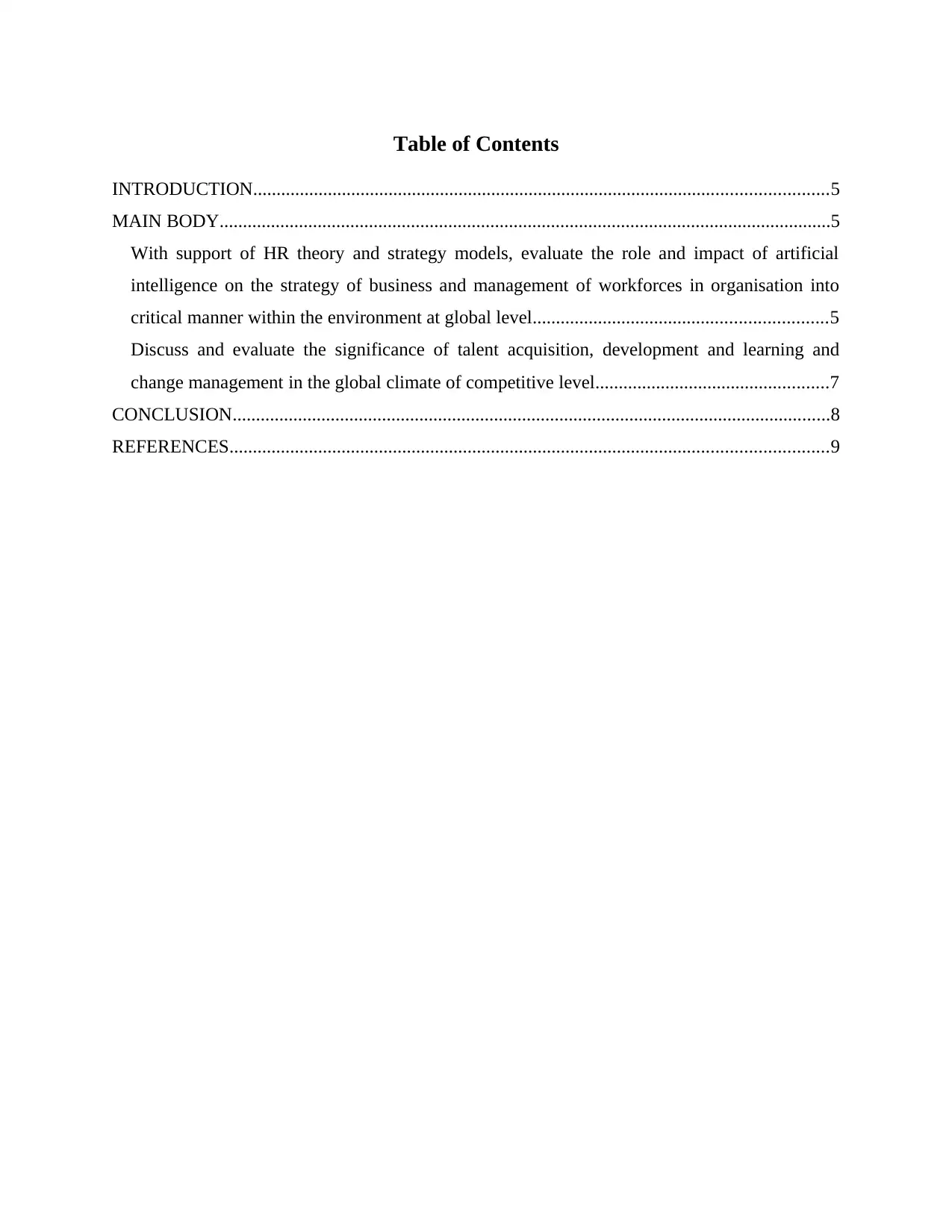
Table of Contents
INTRODUCTION...........................................................................................................................5
MAIN BODY...................................................................................................................................5
With support of HR theory and strategy models, evaluate the role and impact of artificial
intelligence on the strategy of business and management of workforces in organisation into
critical manner within the environment at global level...............................................................5
Discuss and evaluate the significance of talent acquisition, development and learning and
change management in the global climate of competitive level..................................................7
CONCLUSION................................................................................................................................8
REFERENCES................................................................................................................................9
INTRODUCTION...........................................................................................................................5
MAIN BODY...................................................................................................................................5
With support of HR theory and strategy models, evaluate the role and impact of artificial
intelligence on the strategy of business and management of workforces in organisation into
critical manner within the environment at global level...............................................................5
Discuss and evaluate the significance of talent acquisition, development and learning and
change management in the global climate of competitive level..................................................7
CONCLUSION................................................................................................................................8
REFERENCES................................................................................................................................9
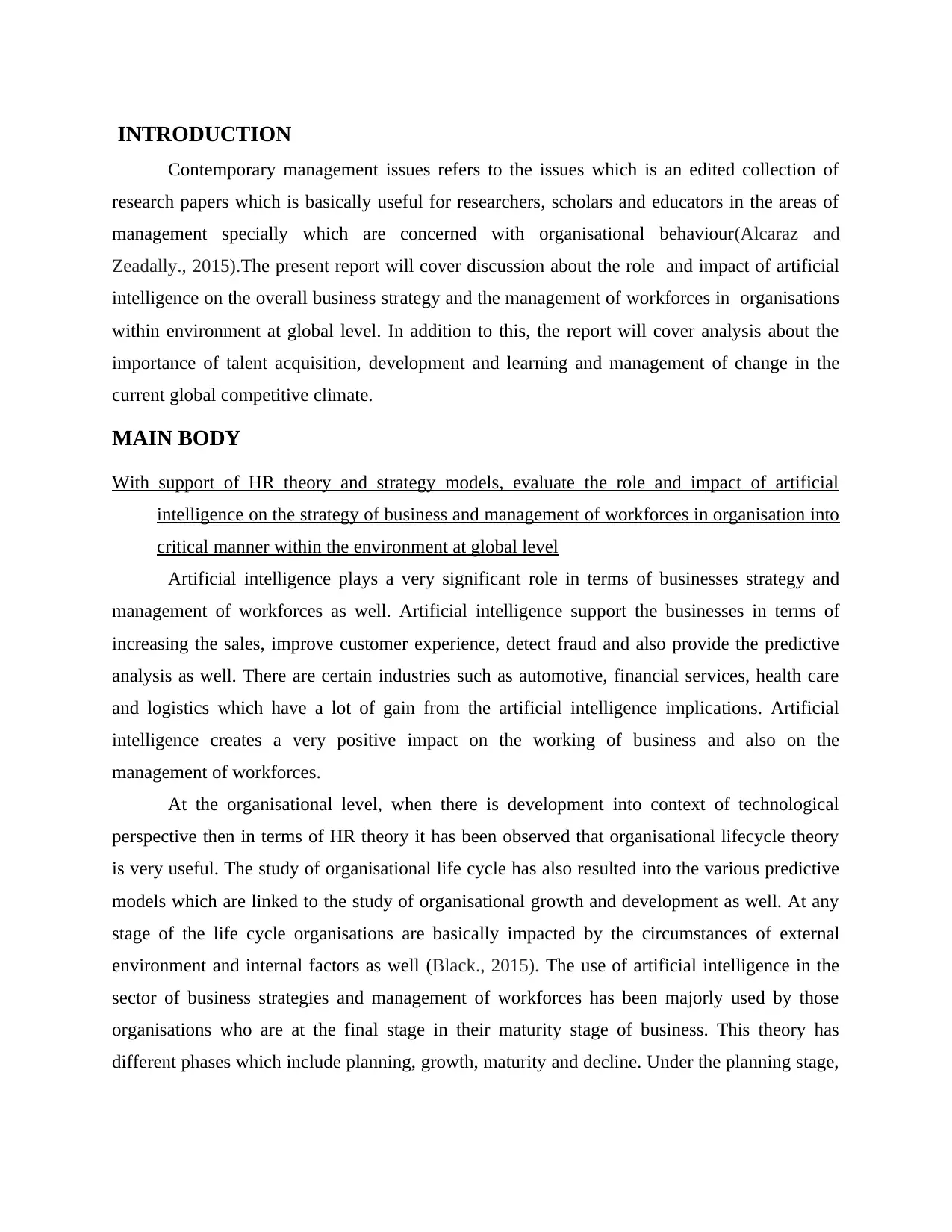
INTRODUCTION
Contemporary management issues refers to the issues which is an edited collection of
research papers which is basically useful for researchers, scholars and educators in the areas of
management specially which are concerned with organisational behaviour(Alcaraz and
Zeadally., 2015).The present report will cover discussion about the role and impact of artificial
intelligence on the overall business strategy and the management of workforces in organisations
within environment at global level. In addition to this, the report will cover analysis about the
importance of talent acquisition, development and learning and management of change in the
current global competitive climate.
MAIN BODY
With support of HR theory and strategy models, evaluate the role and impact of artificial
intelligence on the strategy of business and management of workforces in organisation into
critical manner within the environment at global level
Artificial intelligence plays a very significant role in terms of businesses strategy and
management of workforces as well. Artificial intelligence support the businesses in terms of
increasing the sales, improve customer experience, detect fraud and also provide the predictive
analysis as well. There are certain industries such as automotive, financial services, health care
and logistics which have a lot of gain from the artificial intelligence implications. Artificial
intelligence creates a very positive impact on the working of business and also on the
management of workforces.
At the organisational level, when there is development into context of technological
perspective then in terms of HR theory it has been observed that organisational lifecycle theory
is very useful. The study of organisational life cycle has also resulted into the various predictive
models which are linked to the study of organisational growth and development as well. At any
stage of the life cycle organisations are basically impacted by the circumstances of external
environment and internal factors as well (Black., 2015). The use of artificial intelligence in the
sector of business strategies and management of workforces has been majorly used by those
organisations who are at the final stage in their maturity stage of business. This theory has
different phases which include planning, growth, maturity and decline. Under the planning stage,
Contemporary management issues refers to the issues which is an edited collection of
research papers which is basically useful for researchers, scholars and educators in the areas of
management specially which are concerned with organisational behaviour(Alcaraz and
Zeadally., 2015).The present report will cover discussion about the role and impact of artificial
intelligence on the overall business strategy and the management of workforces in organisations
within environment at global level. In addition to this, the report will cover analysis about the
importance of talent acquisition, development and learning and management of change in the
current global competitive climate.
MAIN BODY
With support of HR theory and strategy models, evaluate the role and impact of artificial
intelligence on the strategy of business and management of workforces in organisation into
critical manner within the environment at global level
Artificial intelligence plays a very significant role in terms of businesses strategy and
management of workforces as well. Artificial intelligence support the businesses in terms of
increasing the sales, improve customer experience, detect fraud and also provide the predictive
analysis as well. There are certain industries such as automotive, financial services, health care
and logistics which have a lot of gain from the artificial intelligence implications. Artificial
intelligence creates a very positive impact on the working of business and also on the
management of workforces.
At the organisational level, when there is development into context of technological
perspective then in terms of HR theory it has been observed that organisational lifecycle theory
is very useful. The study of organisational life cycle has also resulted into the various predictive
models which are linked to the study of organisational growth and development as well. At any
stage of the life cycle organisations are basically impacted by the circumstances of external
environment and internal factors as well (Black., 2015). The use of artificial intelligence in the
sector of business strategies and management of workforces has been majorly used by those
organisations who are at the final stage in their maturity stage of business. This theory has
different phases which include planning, growth, maturity and decline. Under the planning stage,
⊘ This is a preview!⊘
Do you want full access?
Subscribe today to unlock all pages.

Trusted by 1+ million students worldwide
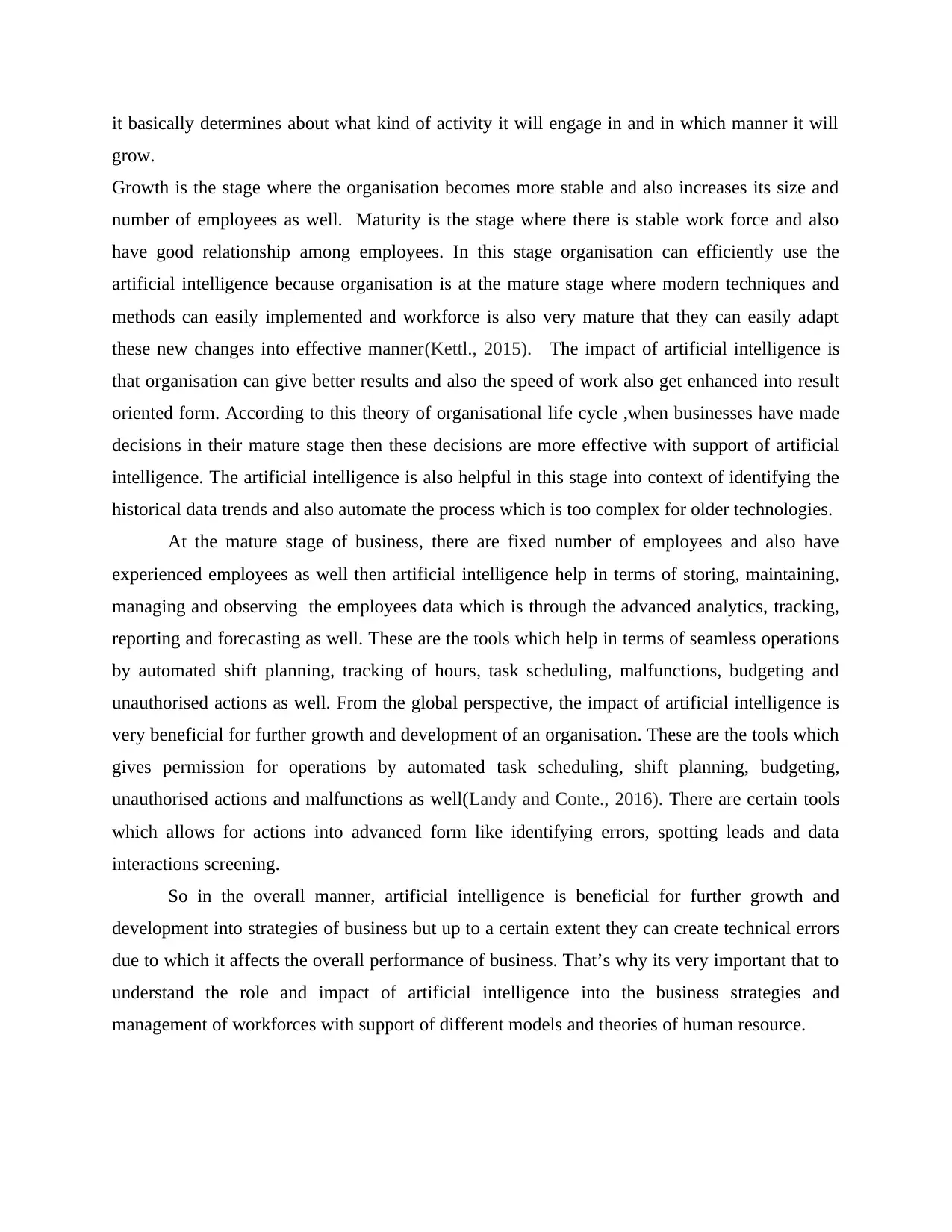
it basically determines about what kind of activity it will engage in and in which manner it will
grow.
Growth is the stage where the organisation becomes more stable and also increases its size and
number of employees as well. Maturity is the stage where there is stable work force and also
have good relationship among employees. In this stage organisation can efficiently use the
artificial intelligence because organisation is at the mature stage where modern techniques and
methods can easily implemented and workforce is also very mature that they can easily adapt
these new changes into effective manner(Kettl., 2015). The impact of artificial intelligence is
that organisation can give better results and also the speed of work also get enhanced into result
oriented form. According to this theory of organisational life cycle ,when businesses have made
decisions in their mature stage then these decisions are more effective with support of artificial
intelligence. The artificial intelligence is also helpful in this stage into context of identifying the
historical data trends and also automate the process which is too complex for older technologies.
At the mature stage of business, there are fixed number of employees and also have
experienced employees as well then artificial intelligence help in terms of storing, maintaining,
managing and observing the employees data which is through the advanced analytics, tracking,
reporting and forecasting as well. These are the tools which help in terms of seamless operations
by automated shift planning, tracking of hours, task scheduling, malfunctions, budgeting and
unauthorised actions as well. From the global perspective, the impact of artificial intelligence is
very beneficial for further growth and development of an organisation. These are the tools which
gives permission for operations by automated task scheduling, shift planning, budgeting,
unauthorised actions and malfunctions as well(Landy and Conte., 2016). There are certain tools
which allows for actions into advanced form like identifying errors, spotting leads and data
interactions screening.
So in the overall manner, artificial intelligence is beneficial for further growth and
development into strategies of business but up to a certain extent they can create technical errors
due to which it affects the overall performance of business. That’s why its very important that to
understand the role and impact of artificial intelligence into the business strategies and
management of workforces with support of different models and theories of human resource.
grow.
Growth is the stage where the organisation becomes more stable and also increases its size and
number of employees as well. Maturity is the stage where there is stable work force and also
have good relationship among employees. In this stage organisation can efficiently use the
artificial intelligence because organisation is at the mature stage where modern techniques and
methods can easily implemented and workforce is also very mature that they can easily adapt
these new changes into effective manner(Kettl., 2015). The impact of artificial intelligence is
that organisation can give better results and also the speed of work also get enhanced into result
oriented form. According to this theory of organisational life cycle ,when businesses have made
decisions in their mature stage then these decisions are more effective with support of artificial
intelligence. The artificial intelligence is also helpful in this stage into context of identifying the
historical data trends and also automate the process which is too complex for older technologies.
At the mature stage of business, there are fixed number of employees and also have
experienced employees as well then artificial intelligence help in terms of storing, maintaining,
managing and observing the employees data which is through the advanced analytics, tracking,
reporting and forecasting as well. These are the tools which help in terms of seamless operations
by automated shift planning, tracking of hours, task scheduling, malfunctions, budgeting and
unauthorised actions as well. From the global perspective, the impact of artificial intelligence is
very beneficial for further growth and development of an organisation. These are the tools which
gives permission for operations by automated task scheduling, shift planning, budgeting,
unauthorised actions and malfunctions as well(Landy and Conte., 2016). There are certain tools
which allows for actions into advanced form like identifying errors, spotting leads and data
interactions screening.
So in the overall manner, artificial intelligence is beneficial for further growth and
development into strategies of business but up to a certain extent they can create technical errors
due to which it affects the overall performance of business. That’s why its very important that to
understand the role and impact of artificial intelligence into the business strategies and
management of workforces with support of different models and theories of human resource.
Paraphrase This Document
Need a fresh take? Get an instant paraphrase of this document with our AI Paraphraser
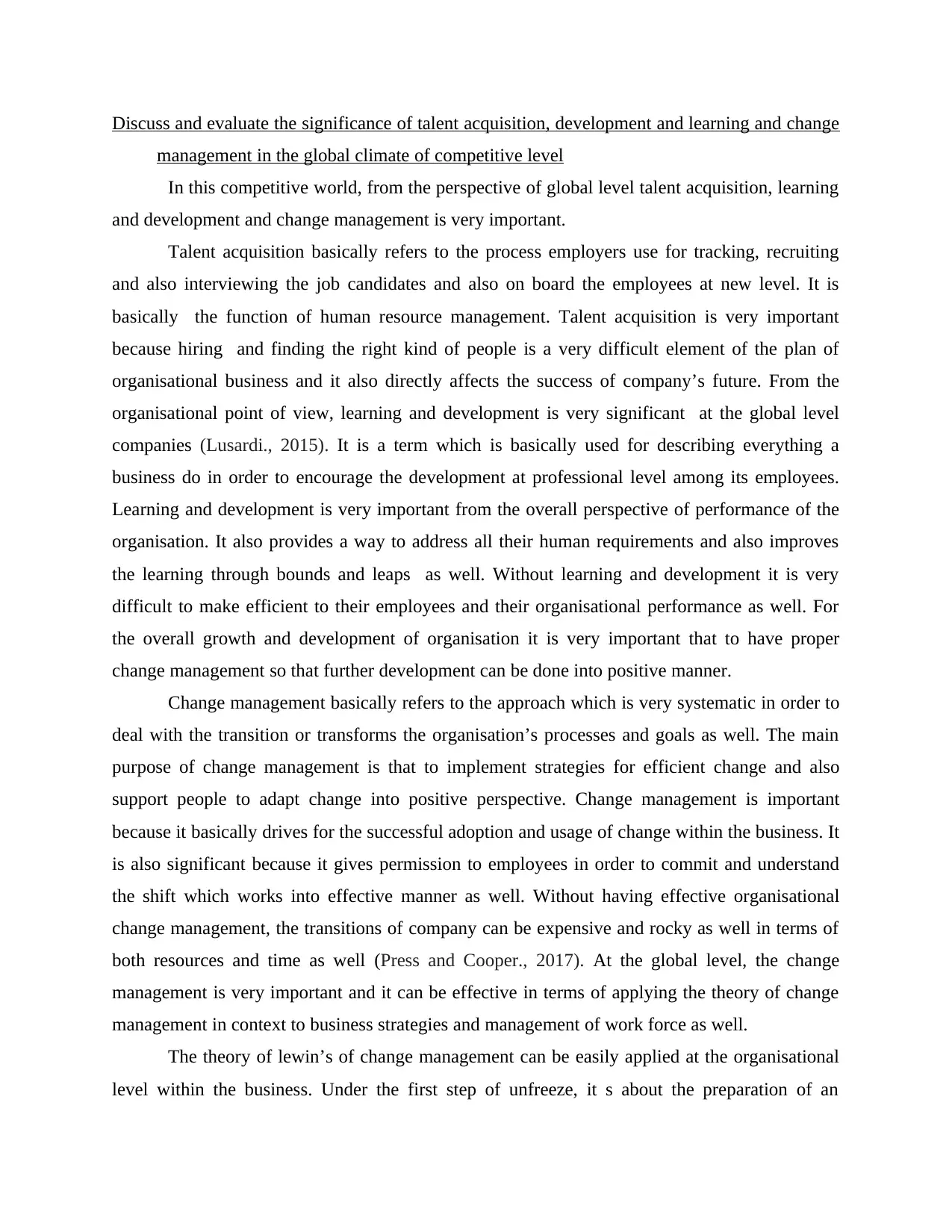
Discuss and evaluate the significance of talent acquisition, development and learning and change
management in the global climate of competitive level
In this competitive world, from the perspective of global level talent acquisition, learning
and development and change management is very important.
Talent acquisition basically refers to the process employers use for tracking, recruiting
and also interviewing the job candidates and also on board the employees at new level. It is
basically the function of human resource management. Talent acquisition is very important
because hiring and finding the right kind of people is a very difficult element of the plan of
organisational business and it also directly affects the success of company’s future. From the
organisational point of view, learning and development is very significant at the global level
companies (Lusardi., 2015). It is a term which is basically used for describing everything a
business do in order to encourage the development at professional level among its employees.
Learning and development is very important from the overall perspective of performance of the
organisation. It also provides a way to address all their human requirements and also improves
the learning through bounds and leaps as well. Without learning and development it is very
difficult to make efficient to their employees and their organisational performance as well. For
the overall growth and development of organisation it is very important that to have proper
change management so that further development can be done into positive manner.
Change management basically refers to the approach which is very systematic in order to
deal with the transition or transforms the organisation’s processes and goals as well. The main
purpose of change management is that to implement strategies for efficient change and also
support people to adapt change into positive perspective. Change management is important
because it basically drives for the successful adoption and usage of change within the business. It
is also significant because it gives permission to employees in order to commit and understand
the shift which works into effective manner as well. Without having effective organisational
change management, the transitions of company can be expensive and rocky as well in terms of
both resources and time as well (Press and Cooper., 2017). At the global level, the change
management is very important and it can be effective in terms of applying the theory of change
management in context to business strategies and management of work force as well.
The theory of lewin’s of change management can be easily applied at the organisational
level within the business. Under the first step of unfreeze, it s about the preparation of an
management in the global climate of competitive level
In this competitive world, from the perspective of global level talent acquisition, learning
and development and change management is very important.
Talent acquisition basically refers to the process employers use for tracking, recruiting
and also interviewing the job candidates and also on board the employees at new level. It is
basically the function of human resource management. Talent acquisition is very important
because hiring and finding the right kind of people is a very difficult element of the plan of
organisational business and it also directly affects the success of company’s future. From the
organisational point of view, learning and development is very significant at the global level
companies (Lusardi., 2015). It is a term which is basically used for describing everything a
business do in order to encourage the development at professional level among its employees.
Learning and development is very important from the overall perspective of performance of the
organisation. It also provides a way to address all their human requirements and also improves
the learning through bounds and leaps as well. Without learning and development it is very
difficult to make efficient to their employees and their organisational performance as well. For
the overall growth and development of organisation it is very important that to have proper
change management so that further development can be done into positive manner.
Change management basically refers to the approach which is very systematic in order to
deal with the transition or transforms the organisation’s processes and goals as well. The main
purpose of change management is that to implement strategies for efficient change and also
support people to adapt change into positive perspective. Change management is important
because it basically drives for the successful adoption and usage of change within the business. It
is also significant because it gives permission to employees in order to commit and understand
the shift which works into effective manner as well. Without having effective organisational
change management, the transitions of company can be expensive and rocky as well in terms of
both resources and time as well (Press and Cooper., 2017). At the global level, the change
management is very important and it can be effective in terms of applying the theory of change
management in context to business strategies and management of work force as well.
The theory of lewin’s of change management can be easily applied at the organisational
level within the business. Under the first step of unfreeze, it s about the preparation of an
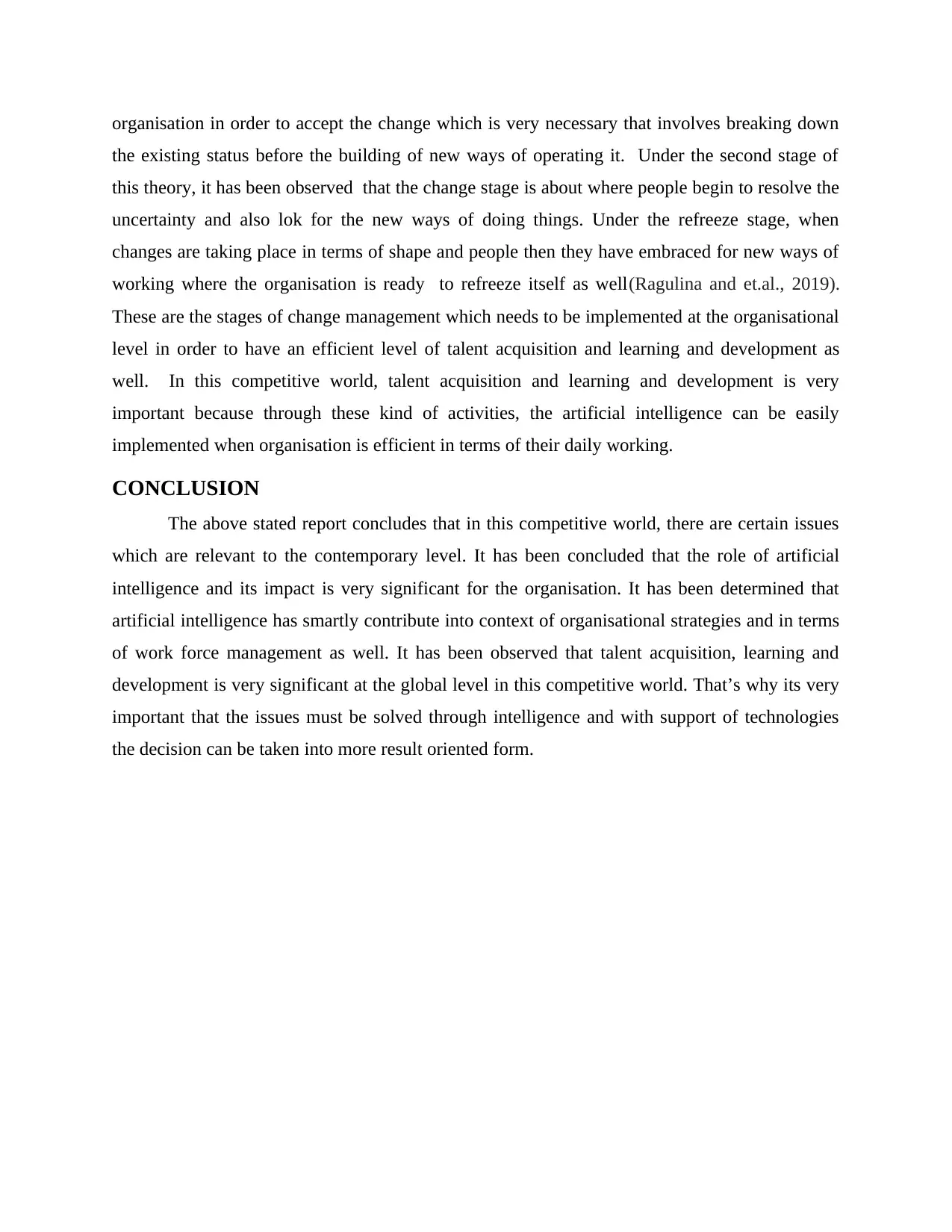
organisation in order to accept the change which is very necessary that involves breaking down
the existing status before the building of new ways of operating it. Under the second stage of
this theory, it has been observed that the change stage is about where people begin to resolve the
uncertainty and also lok for the new ways of doing things. Under the refreeze stage, when
changes are taking place in terms of shape and people then they have embraced for new ways of
working where the organisation is ready to refreeze itself as well(Ragulina and et.al., 2019).
These are the stages of change management which needs to be implemented at the organisational
level in order to have an efficient level of talent acquisition and learning and development as
well. In this competitive world, talent acquisition and learning and development is very
important because through these kind of activities, the artificial intelligence can be easily
implemented when organisation is efficient in terms of their daily working.
CONCLUSION
The above stated report concludes that in this competitive world, there are certain issues
which are relevant to the contemporary level. It has been concluded that the role of artificial
intelligence and its impact is very significant for the organisation. It has been determined that
artificial intelligence has smartly contribute into context of organisational strategies and in terms
of work force management as well. It has been observed that talent acquisition, learning and
development is very significant at the global level in this competitive world. That’s why its very
important that the issues must be solved through intelligence and with support of technologies
the decision can be taken into more result oriented form.
the existing status before the building of new ways of operating it. Under the second stage of
this theory, it has been observed that the change stage is about where people begin to resolve the
uncertainty and also lok for the new ways of doing things. Under the refreeze stage, when
changes are taking place in terms of shape and people then they have embraced for new ways of
working where the organisation is ready to refreeze itself as well(Ragulina and et.al., 2019).
These are the stages of change management which needs to be implemented at the organisational
level in order to have an efficient level of talent acquisition and learning and development as
well. In this competitive world, talent acquisition and learning and development is very
important because through these kind of activities, the artificial intelligence can be easily
implemented when organisation is efficient in terms of their daily working.
CONCLUSION
The above stated report concludes that in this competitive world, there are certain issues
which are relevant to the contemporary level. It has been concluded that the role of artificial
intelligence and its impact is very significant for the organisation. It has been determined that
artificial intelligence has smartly contribute into context of organisational strategies and in terms
of work force management as well. It has been observed that talent acquisition, learning and
development is very significant at the global level in this competitive world. That’s why its very
important that the issues must be solved through intelligence and with support of technologies
the decision can be taken into more result oriented form.
⊘ This is a preview!⊘
Do you want full access?
Subscribe today to unlock all pages.

Trusted by 1+ million students worldwide
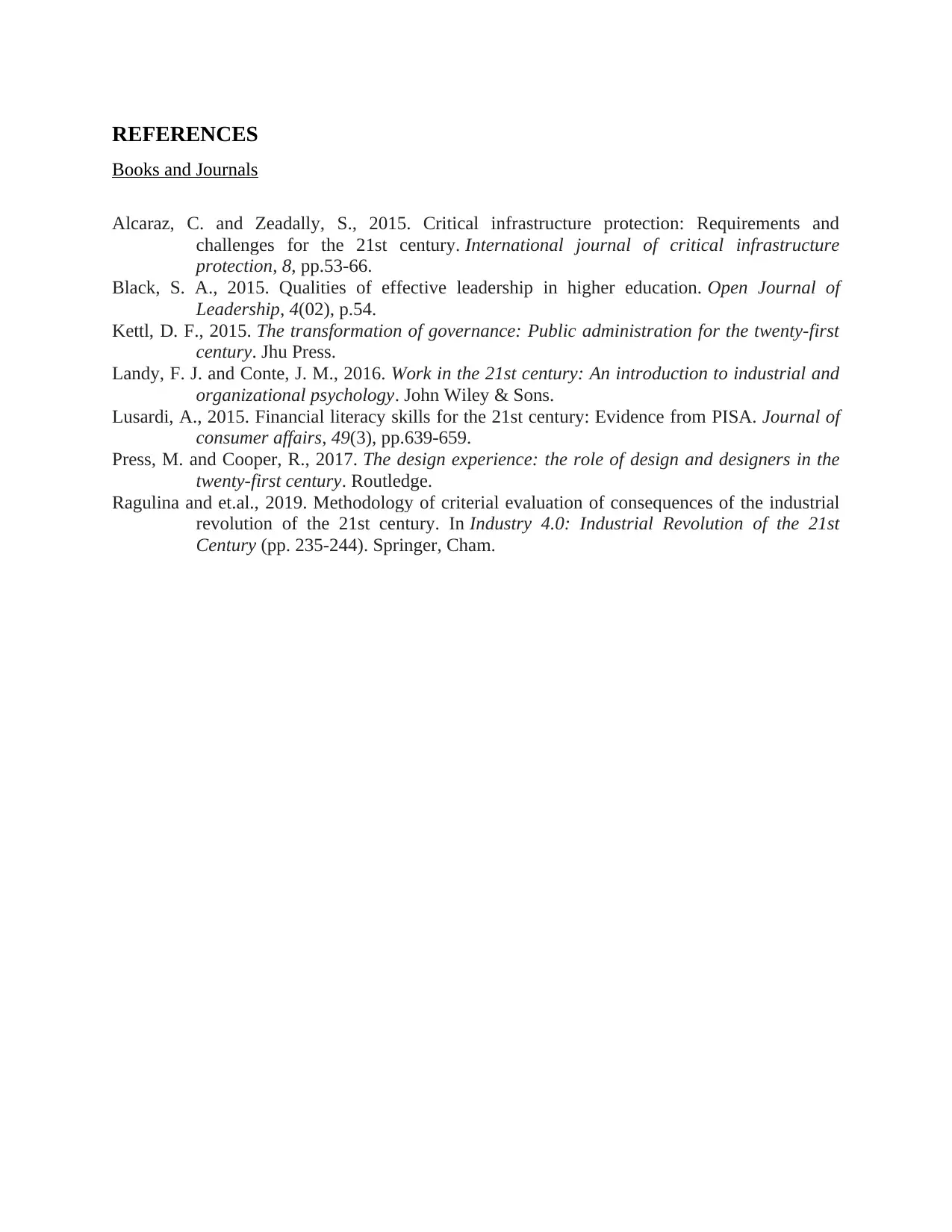
REFERENCES
Books and Journals
Alcaraz, C. and Zeadally, S., 2015. Critical infrastructure protection: Requirements and
challenges for the 21st century. International journal of critical infrastructure
protection, 8, pp.53-66.
Black, S. A., 2015. Qualities of effective leadership in higher education. Open Journal of
Leadership, 4(02), p.54.
Kettl, D. F., 2015. The transformation of governance: Public administration for the twenty-first
century. Jhu Press.
Landy, F. J. and Conte, J. M., 2016. Work in the 21st century: An introduction to industrial and
organizational psychology. John Wiley & Sons.
Lusardi, A., 2015. Financial literacy skills for the 21st century: Evidence from PISA. Journal of
consumer affairs, 49(3), pp.639-659.
Press, M. and Cooper, R., 2017. The design experience: the role of design and designers in the
twenty-first century. Routledge.
Ragulina and et.al., 2019. Methodology of criterial evaluation of consequences of the industrial
revolution of the 21st century. In Industry 4.0: Industrial Revolution of the 21st
Century (pp. 235-244). Springer, Cham.
Books and Journals
Alcaraz, C. and Zeadally, S., 2015. Critical infrastructure protection: Requirements and
challenges for the 21st century. International journal of critical infrastructure
protection, 8, pp.53-66.
Black, S. A., 2015. Qualities of effective leadership in higher education. Open Journal of
Leadership, 4(02), p.54.
Kettl, D. F., 2015. The transformation of governance: Public administration for the twenty-first
century. Jhu Press.
Landy, F. J. and Conte, J. M., 2016. Work in the 21st century: An introduction to industrial and
organizational psychology. John Wiley & Sons.
Lusardi, A., 2015. Financial literacy skills for the 21st century: Evidence from PISA. Journal of
consumer affairs, 49(3), pp.639-659.
Press, M. and Cooper, R., 2017. The design experience: the role of design and designers in the
twenty-first century. Routledge.
Ragulina and et.al., 2019. Methodology of criterial evaluation of consequences of the industrial
revolution of the 21st century. In Industry 4.0: Industrial Revolution of the 21st
Century (pp. 235-244). Springer, Cham.
Paraphrase This Document
Need a fresh take? Get an instant paraphrase of this document with our AI Paraphraser


⊘ This is a preview!⊘
Do you want full access?
Subscribe today to unlock all pages.

Trusted by 1+ million students worldwide

Paraphrase This Document
Need a fresh take? Get an instant paraphrase of this document with our AI Paraphraser

1 out of 11
Related Documents
Your All-in-One AI-Powered Toolkit for Academic Success.
+13062052269
info@desklib.com
Available 24*7 on WhatsApp / Email
![[object Object]](/_next/static/media/star-bottom.7253800d.svg)
Unlock your academic potential
Copyright © 2020–2026 A2Z Services. All Rights Reserved. Developed and managed by ZUCOL.

